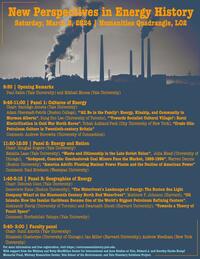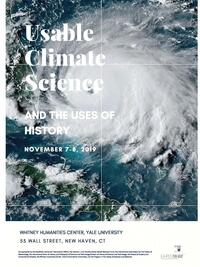Special Initiatives

Climate History
Yale faculty and students are exploring the relationship between climate, ecology, and the historical evolution of societies, institutions, and economies. Key questions include: How can academics in the humanities and social sciences sort through the enormous amount of climate science that has been generated in recent years? How does this data map onto the historical record? How has human society adapted and responded to climate and ecological change in the past, and how might it in the present and future?
The Yale Nile Initiative, an ongoing NSF-sponsored project led by Professor Joseph Manning, continues to investigate the link between explosive volcanic eruptions and the annual Nile river summer flooding in antiquity. Several years ago, Yale hosted an interdisciplinary workshop, “Usable Climate Science and the Uses of History,” co-organized by Professor Deborah Coen, to reflect critically on the ideals and practices of “cooperative” modes of climate change research, past and present.
Faculty involved include: Joe Manning (Classics & History); Deborah Coen (History); Harvey Weiss (Environment); Jennifer Marlon (Environment); Sunil Amrith (History); Alan Mikhail (History); Stuart Schwartz (History); Fabian Drixler (History); Michael Dove (Environmental Studies); Rod Mcintosh (Anthropology); Anne Underhill (Anthropology).
Energy History
A growing cohort of faculty and graduate students are studying the history of energy from a global perspective, including projects in U.S. history, South and Southeast Asia, Africa, Russia, and elsewhere. Collaborative projects in Energy History and Energy Humanities explore pedagogical approaches to teaching about energy and studying energy topics across the humanities disciplines. Energy History Online is a teaching website with primary source units highlighting key aspects of U.S. energy history, including hydropower, coal mining, oil, electricity, etc.
 Yale Environmental History hosted a “New Perspectives in Energy History” conference in March 2024, with panel sessions featuring papers by doctoral students and postdoctoral fellows and a closing faculty panel discussing new directions in energy history. The conference sought to build upon recent contributions that have aimed to better situate the role energy resources have played in driving historical change for societies and ecologies from early modernity to the present.
Yale Environmental History hosted a “New Perspectives in Energy History” conference in March 2024, with panel sessions featuring papers by doctoral students and postdoctoral fellows and a closing faculty panel discussing new directions in energy history. The conference sought to build upon recent contributions that have aimed to better situate the role energy resources have played in driving historical change for societies and ecologies from early modernity to the present.
A collaborative project to develop teaching materials about the environmental history of New Haven.
Faculty involved include Paul Sabin (History); Elihu Rubin (Architecture, American Studies) Amity Doolittle (Environment).
